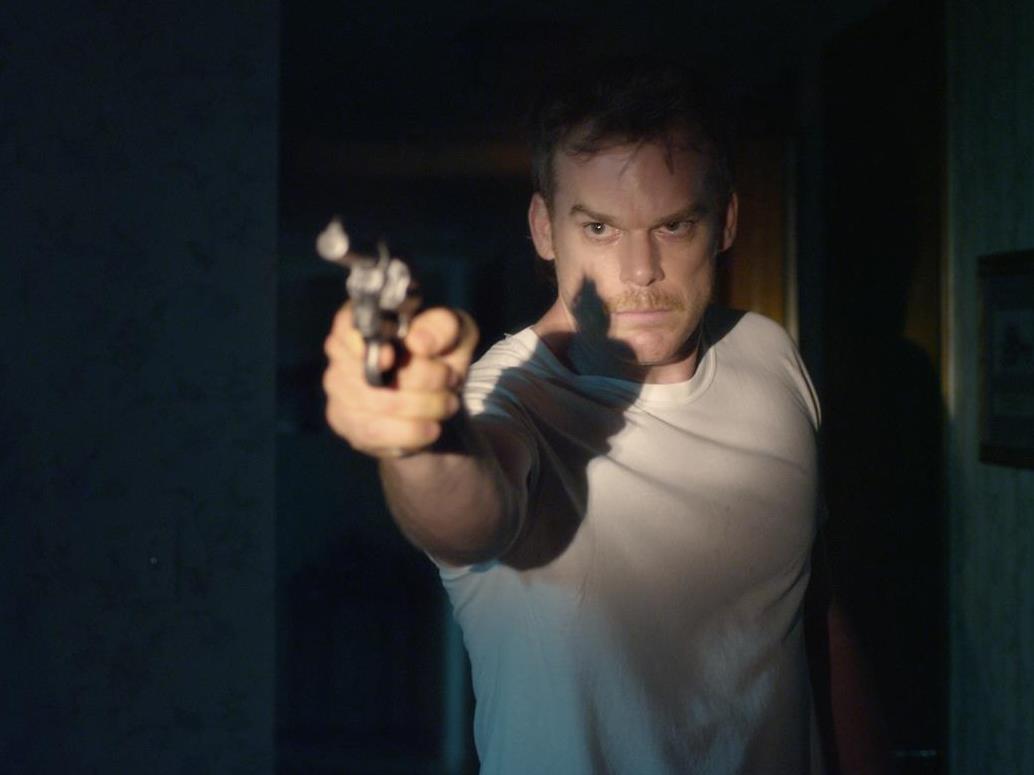It takes ambition to not only aspire to make a movie unafraid of changing style and tone as it unravels, but also to actually do so – and to do so well. That’s Cold in July: a grim, gritty film dripping with violence that doesn’t shy away from a challenge or from potentially challenging content. In appropriating the successful elements of home invasion thrillers, revenge dramas, conspiracy theories, pulp nasties, noir mysteries and even comedic buddy comedies into a B-movie-esque package, Jim Mickle’s fourth effort establishes him as a master of pervasive, punchy unpleasantness painted with panache and precision.
With Stakeland and the English-language remake of We Are What We Are the most recent prior titles on his resume, Mickle’s credentials had been amassing, slowly but surely; however here the writer/director plays his surest hand from the dark and devilish pack of cards he has made his own. Joe R. Lansdale’s 1989 novel of the same name provides the source material, as adapted with the filmmaker’s frequent collaborator, Nick Damici. The helmer furnishes the murk and menace, and the suspense and many shades of sinister.
In 1989, Richard Dane (Michael C. Hall, Kill Your Darlings) wakes from his night-time slumber to find an intruder in the home he shares with wife Ann (Vinessa Shaw, Side Effects) and son Jordan (Brogan Hall), doing what most small-town Texans would by shooting first and asking questions later. He is hailed as a hero, but can’t be convinced of the merits of his actions. The perpetrator the cops have named and shamed in death doesn’t match his recollection, and the threatening presence of the boy’s just-out-of-jail father, Russel (Sam Shepard, Out of the Furnace), can’t be shaken. It will take the assistance of a brash private detective, Jim Bob (Don Johnson, The Other Woman), to crawl to the core of Richard’s uncertainty.
Taking its Southern everyman lead down a rabbit hole that embraces overt acts of murder, corruption and awful deeds caught on video, as well as underlying themes of patriarchal legacy and the echoing of sins through generations, Cold in July cant be characterised as a nice or nuanced offering in any aspect. Instead, it relishes its dwelling in all things unseemly, aiming to elicit discomfort and never falling short of the mark. The film also revels in the homage it pays to its many predecessors by doing so, visually marked by mirrored camera angles and the casting of its unlikely trio of protagonists in all-too-telling shadows.
In many of its plot developments, the feature further wades through decades of its genre bearings with brazen obviousness to chill with old-fashioned care and confidence. Its intentions are announced from the outset, from the moment the font familiar to fans of John Carpenter’s (Halloween, The Thing) work emblazons the feature’s title on screen. The legendary filmmaker’s impact can also be felt in an electro-synth score that sets an electrifying mood, pitched between alarming and rousing, and an aesthetic preference for all things bleak and bloody. A wealth of other movie influences make themselves apparent in the bruising brutality of men trapped in a cycle of vengeance, notably the 1990s indie crime oeuvre.
Performances similarly muster a balance of the refashioned and the recognisable, including Hall channelling Six Feet Under, not Dexter, from his television back catalogue, Shepard continuing his spate of stellar supporting parts (with Mud and Killing Them Softly among his recent output), and Johnson stealing scenes and having as much fun as anyone can within such confines. Their respective tenors, each vibrating on different frequencies but making an enjoyably eclectic amalgam, match the film’s mood jumps and narrative shifts – and add moments of deliciously satirical humour, as well as heartfelt revelations. The melange can be jarring, yet perhaps inexplicably it works, comprising a cohesive rather than disjointed whole. Indeed, that the many components combine to see Cold in July’s aspirations come to fruition firmly within its neo-noir stylings is an achievement worthy of its ambition, not to mention a shockingly crafty and compelling viewing experience.
Rating: 4 out of 5 stars
Cold in July
Director: Jim Mickle
USA / France, 2014, 109 mins
Revelation Perth International Film Festival
www.revelationfilmfest.org
3 – 13 July
Actors:
Director:
Format:
Country:
Release:





